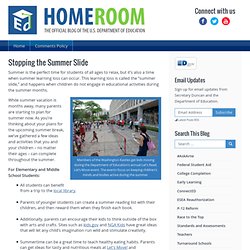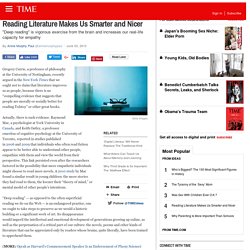

Three Ways to Prevent Summer Slide. Keeping Kids Off the Summer Slide. Something is waiting for many children each summer and their parents don’t even know it’s out there.

It's called the "summer slide," and it describes what happens when young minds sit idle for three months. As parents approach the summer break, many are thinking about the family vacation, trips to the pool, how to keep children engaged in activities at home, the abrupt changes to everyone's schedule—and how to juggle it all. What they might not be focusing on is how much educational ground their children could lose during the three-month break from school, particularly when it comes to reading. Experts agree that children who read during the summer gain reading skills, while those who do not often slide backward. According to the authors of a report from the National Summer Learning Association: "A conservative estimate of lost instructional time is approximately two months or roughly 22 percent of the school year.... Source: Reading Is Fundamental.
Stopping the Summer Slide. Summer is the perfect time for students of all ages to relax, but it’s also a time when summer learning loss can occur.

This learning loss is called the “summer slide,” and happens when children do not engage in educational activities during the summer months. Members of the Washington Kastles get kids moving during the Department of Education’s annual Let’s Read, Let’s Move event. The events focus on keeping children’s minds and bodies active during the summer. While summer vacation is months away, many parents are starting to plan for summer now. As you’re thinking about your plans for the upcoming summer break, we’ve gathered a few ideas and activities that you and your children – no matter their ages – can complete throughout the summer. For Elementary and Middle School Students: For High School Students:
Reading Literature Makes Us Smarter and Nicer. Gregory Currie, a professor of philosophy at the University of Nottingham, recently argued in the New York Times that we ought not to claim that literature improves us as people, because there is no “compelling evidence that suggests that people are morally or socially better for reading Tolstoy” or other great books.

Actually, there is such evidence. Raymond Mar, a psychologist at York University in Canada, and Keith Oatley, a professor emeritus of cognitive psychology at the University of Toronto, reported in studies published in 2006 and 2009 that individuals who often read fiction appear to be better able to understand other people, empathize with them and view the world from their perspective. This link persisted even after the researchers factored in the possibility that more empathetic individuals might choose to read more novels.
(MORE: Oprah as Harvard’s Commencement Speaker Is an Endorsement of Phony Science) None of this is likely to happen when we’re scrolling through TMZ. Do Kids Really Have “Summer Learning Loss”? They appear every summer as reliably as the stories about shark attacks: a rash of articles raising the alarm about the “summer slide,” or the loss of learning that grade-school students experience over the months when classes are out. Concern about this leads many a parent to stock up on workbooks and flashcards, or to enroll their children in educational camps and enrichment programs. But is the summer slide really the seasonal disaster that we’ve been warned about? A close look at the research reveals a more complicated picture. For kids from middle and upper-middle income households, for example, the summer slide doesn’t exist at all—at least in terms of reading skills.
Affluent children actually make slight gains in reading over the summer months, according to an analysis of 13 research studies led by Harris Cooper, professor of education at Duke University. Even among underprivileged students, however, the summer slide is not universal. What makes these “outliers” different?